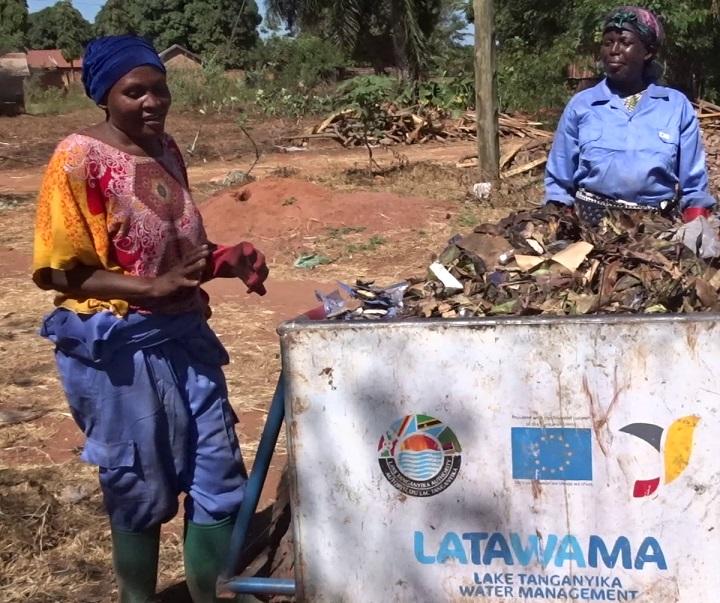Kigoma, Tanzania: Actions to optimise solid waste management bear fruit
In the city of
Kigoma, Tanzania, the LATAWAMA project has been active since January 2020. Many
activities have been carried out. As the project was not a “ready-made project,” the
activities have been defined and the main actors identified with the full participation
of various stakeholders. Community-based organisations are one of the backbones
of solid waste management operations. Besides, other
actions in waste management have also been undertaken. Beneficiaries
talked to the technical team. The feedback is heartening.
Community-based
organizations are composed of women heads of households and young people from
disadvantaged backgrounds, with a maximum of 10 people per organisation. They
are responsible for the pre-collection of solid waste from different places
(households, markets, institutions, etc.) to the collection points (tippers
managed by the Municipality).
They are keys players of a
project guided by four principles: increasing service coverage, strengthening
management capacity, introducing the principles of the circular economy (using
yesterday’s waste as a resource for tomorrow), organising awareness and education
campaigns.
At the beginning of the
project, community-based organizations faced two major challenges: inadequate
facilities and weak organisational and management capacities. The LATAWAMA
project provided technical support to community-based organisations to ensure
that they could carry out their mission and initiated a series of actions for
organisational strengthening.
Partners satisfied with LATAWAMA project achievements
The members of the community-based organizations
directly supported by the LATAWAMA project said that the material given was of
paramount importance. Bahati Rhamadhani is a mother of about 40 years,
living in the locality of Katubuka. With her friends, while collecting the
waste, she said that the equipment that the LATAWAMA project gave them makes it
possible to collect the waste. “With this work, we get money, and it helps us
meet some of our needs. We, therefore, thank the LATAWAMA project which gave us
material”. The remaining challenge is that the population still mixing
household waste with other things like stones, bricks, and even needles.“ We try
to sensitize them for a behavior change”, she said.
The same goes for Elishaphat Ruzemvya, Director
of the department responsible for solid waste management. He said that the support was of great importance for improving solid waste
management in Kigoma: “I am here to attest to the importance of LATAWAMA’s
support for solid waste management in the Municipality of Kigoma. I would
like to thank Enabel and the European Union for their support. I can guarantee
that the support in terms of equipment will be managed effectively for great
sustainability”.
Other actions initiated by the project…
In addition to actions carried out through
community-based organisations, further activities such as the support of the
Maweni Hospital for solid waste management have also been initiated. Rashidi
Masoudi, a health officer, said the situation had improved significantly in
solid waste management at this hospital: “Before, the work was much more difficult. The
waste was burnt in a place that was not adequate. With the repair of the
incinerator, the work became easier. We have been trained in biomedical waste
management. This is the 5th year that I work at Maweni Hospital. Things are
going very well now; all the waste produced here is burned completely”.
For Rajabu Hassan, Biomedical Engineer, the hospital used to have a poor-quality incinerator, which
could not burn waste according to acceptable environmental standards. “The
LATAWAMA project repaired the incinerator that allows us to burn waste quickly.
The ashes generated are also put in the new pit that meets the standards of the
World Health Organization and the ministry of public health. We are all aware
that biomedical waste is dangerous, and we are grateful to the LATAWAMA
Project.”
Nevertheless, he would like to further
collaborate with the project, which will fund the construction of the disposal hall
of sorted waste awaiting incineration.
Funded by the European Union, the LATAWAMA
project is being implemented by Enabel in collaboration with the Tanganyika
Lake Authority.
Latest news from this project
No news

